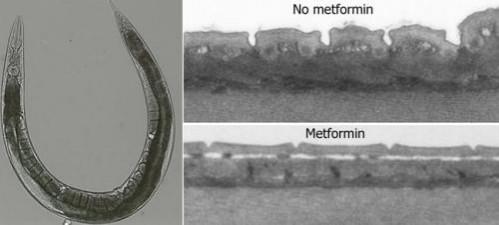
Regular use of a widely used anti-diabetic medication can help one look younger and live longer, claims a new study.
Wouter De Haes and colleagues from KU Leuven in Belgium found that prolonged use of metformin - a drug used to treat type 2 diabetes - led to an increase in the number of toxic oxygen molecules released in the cell and improved cell robustness and longevity.
However, researchers cautioned against taking high doses of the drug as the oxygen molecules produced in the process can cause permanent damages to DNA and cells.
"As long as the amount of harmful oxygen molecules released in the cell remains small, it has a positive long-term effect on the cell. Cells use the reactive oxygen particles to their advantage before they can do any damage," De Haes, said in a statement.
"Metformin causes a slight increase in the number of harmful oxygen molecules. We found that this makes cells stronger and extends their healthy lifespan."
Researchers based their findings on the experiments they conducted on Caenorhabditis elegans, a tiny roundworm which has a life span of three weeks and shows more visible symptoms of ageing. Normally, when the worms get older, they become smaller, wrinkle up and show less mobility. But, the drug showed promising effects on the worms.

"Worms treated with metformin show very limited size loss and no wrinkling. They not only age slower, but they also stay healthier longer," De Haes said. "While we should be careful not to over-extrapolate our findings to humans, the study is promising as a foundation for future research."
Researchers stated that the antioxidants used in the so-called "anti-ageing" food products and cosmetics, including creams, dark chocolate, red wine and vegetable juices, can make the drugs ineffective by deactivating activities of the harmful reactive oxygen molecules in the cell.
Findings of the study have been reported in the journal Proceedings of the National Academy of Sciences.
Pills which can slow down ageing has been a topic highly explored recently. Back in February, a team of scientists from the National Institute of Health in the US found that a protein called sirtuin 1 (SIRT1) played a major role in the ageing process. The activation of the protein was associated with improved life expectancy and prevented development of many age-related diseases in mice models.
Intake of the supplement was associated with an 8.8 percent improvement in lifespan, better muscle function, reduced body weight, improved insulin activity and reduction in bad cholesterol.
Similarly, in March, Dr Margo Adler from the University of New South Wales (UNSW) reported unlimited health benefits, including improved life expectancy with calorie restriction.









